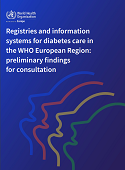Registries and information systems for diabetes care in the WHO European Region: preliminary findings for consultation (2021)

Download
More than 64 million people in the WHO European Region are living with diabetes, placing them at greater risk of complications and comorbidities including cardiovascular diseases and premature mortality. Strengthening health systems for diabetes care and prevention of its complications is a global and European priority towards achieving better diabetes health outcomes. Diabetes registries and diabetes information systems potentially can improve care outcomes as they promote the management of the disease course, prevent complications, ensure quality, enable trends to be estimated and research to be conducted, decrease health expenditure and inform policies.
The aim of this scoping review of qualitative evidence was to generate an overview of the status of diabetes registries and similar information systems in countries of the WHO European Region. The preliminary results show seven countries with a national diabetes registry, 21 with a diabetes registry for certain age groups or types of diabetes and 13 without a national registry; the situation was unclear for remaining countries in the WHO European Region. Seven countries are developing a national registry. Six countries (all in western Europe) have subnational registries.
The scope of diabetes registries varies across countries. Most countries record type 1 and 2 diabetes in children. Diabetes registries are used mainly for surveillance and over half of the countries use registries for clinical management or improving the quality of care. Diabetes registries are also used for research or to support cost estimations, governance and accountability. Where they exist, registries tend to have wide coverage, usually at over 75% of people with diabetes. Lack of standards in data collection has prevented the aggregation of data within and across countries.
Challenges that stand in the way of registries’ success include current regulatory frameworks, unclear ownership and privacy policies, insufficient allocation of resources, lack of international consensus on standards and ineffective technological capacity. Indirect benefits from diabetes registries include empowering patients to improve their health and well-being, fostering dialogue among people with diabetes and health professionals, informing health services and integrating care for diabetes.



